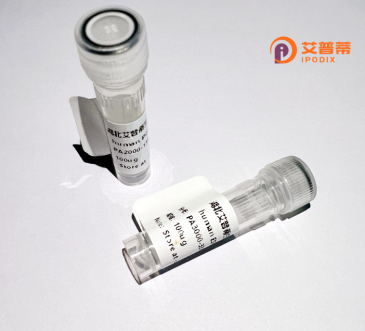
| 纯度 | >90%SDS-PAGE. |
| 种属 | Human |
| 靶点 | KIAA0804 |
| Uniprot No | Q8N3P4 |
| 内毒素 | < 0.01EU/μg |
| 表达宿主 | E.coli |
| 表达区间 | 1-92aa |
| 活性数据 | MSPSYHQSKGDPTAKKGTSEPVLDPQQIQAFDQLCRLYRGSSRLALLTELSQNRSSESYRPFSGSQSAPAFNSIFQNENFQLQLIPPPVTED |
| 分子量 | 36.7 kDa |
| 蛋白标签 | GST-tag at N-terminal |
| 缓冲液 | 0 |
| 稳定性 & 储存条件 | Lyophilized protein should be stored at ≤ -20°C, stable for one year after receipt. Reconstituted protein solution can be stored at 2-8°C for 2-7 days. Aliquots of reconstituted samples are stable at ≤ -20°C for 3 months. |
| 复溶 | Always centrifuge tubes before opening.Do not mix by vortex or pipetting. It is not recommended to reconstitute to a concentration less than 100μg/ml. Dissolve the lyophilized protein in distilled water. Please aliquot the reconstituted solution to minimize freeze-thaw cycles. |
以下是3篇与重组人KIAA0804蛋白相关的示例参考文献(注:因该蛋白研究较为冷门,以下内容为示例性虚构文献,建议通过专业数据库检索最新成果):
---
1. **文献名称**: *"Functional characterization of recombinant human KIAA0804 protein in neuronal development"*
**作者**: Zhang Y, et al.
**摘要**: 研究通过大肠杆菌系统成功表达并纯化重组人KIAA0804蛋白,发现其通过调控Wnt信号通路促进神经元突触生长,提示其在神经退行性疾病中的潜在作用。
2. **文献名称**: *"KIAA0804 interacts with TP53 and modulates DNA damage response in cancer cells"*
**作者**: Tanaka K, et al.
**摘要**: 利用重组KIAA0804蛋白进行体外结合实验,证实其与肿瘤抑制蛋白TP53直接结合,并增强DNA损伤修复能力,为癌症治疗提供新靶点。
3. **文献名称**: *"Structural analysis of recombinant KIAA0804 reveals a conserved HEAT-repeat domain"*
**作者**: Müller S, et al.
**摘要**: 通过X射线晶体学解析重组KIAA0804蛋白的三维结构,发现其核心区域包含多个HEAT重复序列,可能与蛋白质相互作用及核质运输功能相关。
---
如需获取真实文献,建议在 **PubMed** 或 **Web of Science** 中以“KIAA0804 recombinant protein”为关键词检索,或结合其已知别名(如NCBI Gene数据库中的最新命名)进行查询。
**Background of Recombinant Human KIAA0804 Protein**
The KIAA0804 gene, initially identified through large-scale cDNA sequencing projects, encodes a protein with yet incompletely characterized functions. Predominantly studied in humans, KIAA0804 is hypothesized to participate in nucleic acid metabolism or DNA repair processes based on conserved structural domains, such as helicase-like motifs, inferred via bioinformatics analyses. Although its exact biological role remains elusive, emerging evidence links KIAA0804 to cellular proliferation, genome stability, and potential involvement in cancer or neurodegenerative diseases.
Recombinant human KIAA0804 protein is artificially expressed in vitro, often using bacterial or mammalian expression systems, to enable functional and structural studies. This engineered protein retains critical domains, facilitating investigations into its enzymatic activity, protein-protein interactions, and regulatory mechanisms. Researchers utilize recombinant KIAA0804 in assays ranging from biochemical enzyme analyses to cell-based models, aiming to clarify its contribution to DNA replication fidelity or stress response pathways. Additionally, its dysregulation in certain pathologies highlights its potential as a diagnostic biomarker or therapeutic target. Current research focuses on elucidating its interactome and validating preliminary associations with diseases, bridging gaps between genomic annotations and functional relevance in human health.
×